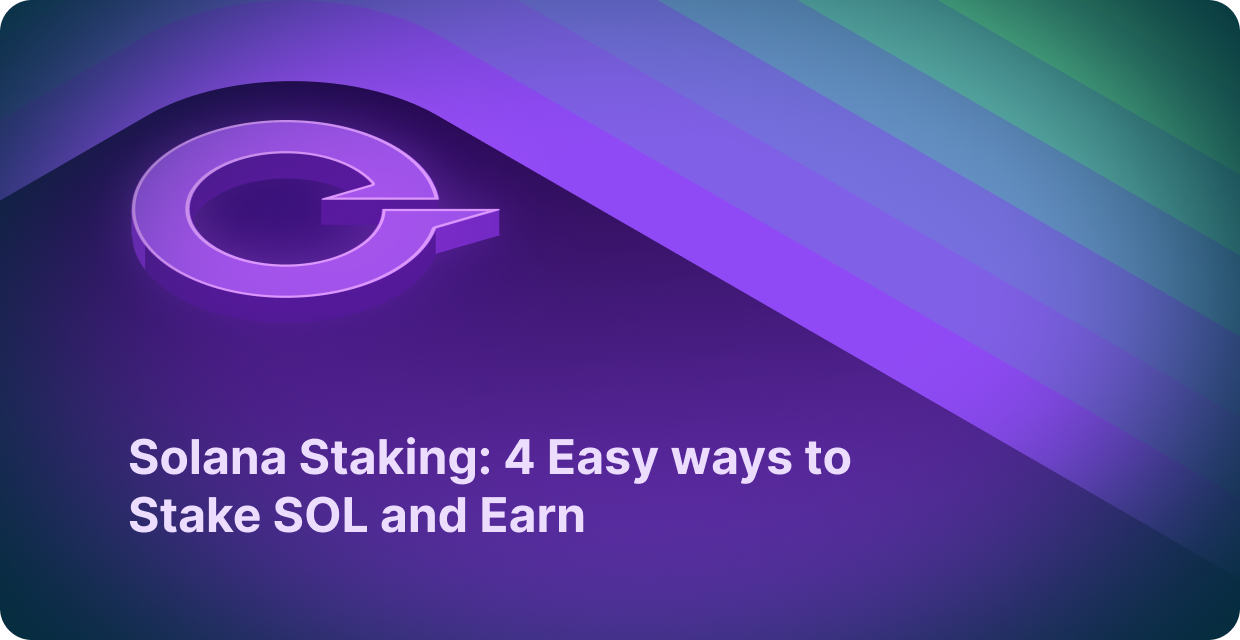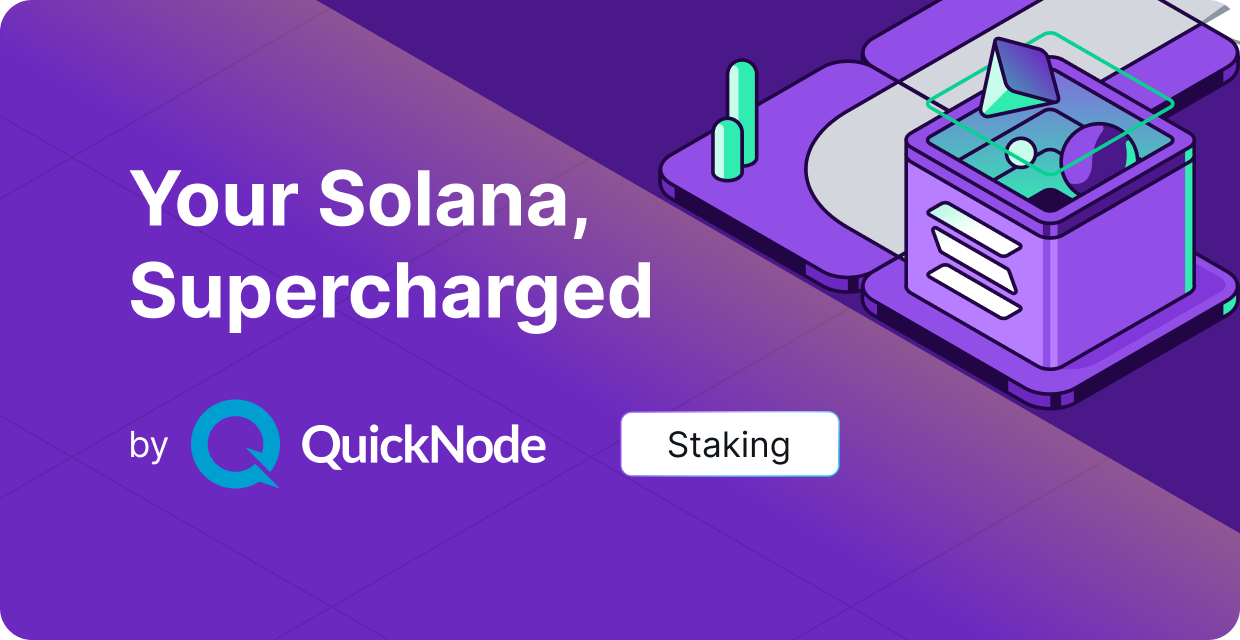Top 10 Crypto Staking Platforms
Discover the top 10 crypto staking validators, featuring premium solutions. Compare commission rates, APY, security features, and supported networks to maximize your crypto staking returns.
Get a blazing-fast RPC endpoint for trading, sniping, automation, and more

QuickNode Solana Validator
by QuickNode

Tenderize
by Tenderize Labs

MANTRA
by MANTRA DAO Team
Institutional Staking
by Figment

Helius Solana Validator
by Helius

Veno Finance
by Veno Finance Team

Ankr Liquid Staking
by Ankr

Liquid Staking
by Lido

StakeWise
by Kirill Kutakov and Dmitri Tsumak

Jito Staking
by Jito Foundation
Solana Staking: How to Earn Rewards and Maximize Your Returns
Solana staking lets you earn rewards by delegating your SOL tokens to support the network. Learn how to start and discover its benefits and risks in this guide.
Key Takeaways
Solana staking allows token holders to earn rewards while supporting the network’s security through a delegated proof-of-stake mechanism.
Staking rewards are predictable, starting at an initial inflation rate of 8% annually, but decrease over time and are distributed at the end of each epoch.
While staking offers benefits such as passive income and asset appreciation, it carries risks including market volatility, lock-up periods, and potential security concerns.
What is Solana Staking?
Staking, in the realm of cryptocurrencies, refers to the process of earning a percentage of crypto coins that are set aside and staked coins. Essentially, it involves committing your assets to support the security and operations of a blockchain network. Within the broader category of crypto staking, cryptocurrency staking, and staking crypto, there are two main types: active and passive staking work.
Solana operates on a proof-of-stake mechanism, where validators are responsible for processing, confirming, and recording transactions on the blockchain. SOL holders can boost a validator’s voting weight by delegating tokens, thus influencing consensus mechanisms decisions. This process not only helps in securing the network but also allows participants to earn staking rewards, making it a win-win situation.
The initial inflation rate for staking on Solana starts at 8% per year, though it decreases over time. This predictable yield provides an attractive incentive for those who choose to stake their SOL tokens. Moreover, staking SOL supports the overall security and functionality of the Solana network, ensuring its robustness and reliability.
How Solana Staking Works
Validators on the Solana network play a crucial role in maintaining the blockchain’s integrity. They are responsible for processing transactions to validate transactions and adding new blocks to the blockchain. The proof-of-stake mechanism employed by Solana requires these validators to gather stake delegations, which enhances network security and trust. SOL token holders can participate by delegating their tokens to these validators, thereby earning rewards while maintaining control over their assets.
The staking process begins with selecting a trusted validator and confirming the amount of SOL to delegate to a staking pool. Once this is done, the stake is activated at the start of the next epoch, which occurs approximately every 2 to 3 days. Should you decide to reverse the staking process, the unstaking process will result in the un-staked tokens remaining locked until the completion of the next epoch. Staking rewards are distributed to delegators at the end of each epoch, providing a regular stream of income.
Validators earn a portion of the rewards and retain a commission for their services, which is deducted before distribution to the delegators. Therefore, monitoring the performance of your selected validator is essential to ensure consistent rewards and that you are rewarded for validating staking effectiveness.
Benefits of Staking Solana (SOL)
One of the most enticing benefits of staking Solana is the potential for capital growth. Participating in staking allows SOL holders to earn rewards through newly issued tokens. These staking rewards serve as income paid to crypto owners for regulating and validating transactions on the network. This creates an opportunity for capital appreciation without the need for active trading.
Staking SOL also enhances the overall security of the Solana network. Distributing stake among various validators makes it harder for malicious actors to compromise the network. Additionally, staking provides an opportunity to earn passive income, allowing participants to earn rewards without actively engaging in the market.
Earning interest on staked assets further enhances the potential for capital growth. This means that in addition to the staking rewards, stakers can benefit from the appreciation of their digital asset tokens, leading to a dual benefit of income, supported assets, investments, and asset growth.
Steps to Start Staking Solana
Starting to stake Solana begins with selecting a suitable wallet that supports staking. This involves choosing a platform, transferring your SOL tokens, selecting a validator, and following specific setup instructions. The process may vary slightly depending on the platform you choose, but the core steps remain the same.
Once you have your wallet set up, the next step is to select a validator. This is a crucial step as the performance and reliability of your chosen validator can significantly impact your staking rewards. After selecting a validator, you can initiate the staking request by delegating your SOL tokens and confirming the delegation.
Let’s break down these steps further to ensure you have a clear understanding of the frequently asked questions regarding the validation process.
Choosing a Wallet
When it comes to choosing a wallet for Solana staking, popular options include Phantom, Solflare, and Exodus. These wallets are known for their user-friendly interfaces and integration with decentralized applications, making them ideal for staking SOL. Phantom Wallet, for instance, allows users to stake SOL directly with variable rewards depending on the chosen validator and has no associated fees.
Solfare Wallet supports staking without fees and integrates with hardware wallets for enhanced security.
Selecting a Validator
Choosing a reliable validator is crucial to ensuring consistent staking rewards and minimizing the risk of slashing or missed epochs. When selecting a validator, it's important to evaluate their uptime, performance history, commission structure, and overall reputation in the ecosystem.
QuickNode, a trusted name in Web3 infrastructure, offers a zero-fee Solana validator with industry-leading uptime, robust security, and MEV reward distribution. Backed by a globally distributed network and years of blockchain infrastructure experience, QuickNode empowers stakers with high-performance validation and transparent reward mechanics.
Initiating the Staking Request
To initiate the staking request, you need to delegate your SOL tokens to the chosen validator through your selected wallet or staking platform. Follow the instructions provided by your wallet or exchange to select a validator and confirm the delegation. This usually involves using a passcode or biometric authentication to confirm your staking request securely.
Once the staking request is confirmed, your SOL tokens will be delegated to the validator, and you will start earning staking rewards. It’s important to monitor your staking activities and adjust your delegation as needed to maximize your returns.
Understanding Staking Rewards on Solana
The initial inflation rate for staked SOL is set at 8% annually, which decreases over time, providing a predictable yield for stakers. Staking rewards are distributed at the end of each epoch, which occurs approximately every two days. This regular distribution ensures that stakers receive a consistent stream of rewards.
Staking rewards on Solana comprise both block rewards and transaction fees. Validators can charge different fees, which can affect the net rewards earned from staking SOL. Therefore, it’s essential to consider the fees charged by your chosen validator when calculating your potential rewards.
The total annual actual rewards available for distribution decrease as more tokens are staked. This means that the reward rate can vary depending on the overall staking participation in the network. Monitoring these factors can help you receive rewards, generate rewards, optimize your staking strategy, and maximize your highest staking rewards generated.
QuickNode: Enhancing Your Solana Staking Experience
QuickNode is a blockchain infrastructure provider that offers nodes to enhance performance and security, making them suitable for high-demand Solana staking applications. QuickNode’s services improve blockchain networks application performance, ensuring that your staking activities are efficient and secure.
QuickNode is SOC 1 Type 2 and SOC 2 Type 2 compliant, providing the best staking infrastructure for users. Leveraging QuickNode’s services enhances your staking experience, ensuring your staked assets are managed reliably and securely.
Liquid Staking Options for Solana
Liquid staking offers a flexible alternative to traditional staking by allowing users to earn rewards while keeping their tokens available for trading. Unlike traditional staking, liquid staking provides liquidity, enabling users to access their assets without a waiting period. This is achieved by receiving a liquid staking derivative (LSD), such as mSOL or stSOL, which can be utilized in DeFi applications.
Using liquid staking derivatives, users can earn additional staking yields by engaging in lending, trading, or yield farming within decentralized finance. However, this flexibility comes with risks, such as smart contract vulnerabilities and potential liquidity issues on centralized exchanges. To mitigate these risks, it’s essential to select reputable liquid staking providers and evaluate their security measures.
Liquid staking tokens can be converted back to SOL through direct unstaking or by trading on decentralized exchanges for instant liquidity. This dual benefit of earning rewards and maintaining liquidity makes liquid staking an attractive option for crypto investors.
Summary
Staking Solana offers a promising way to earn rewards while contributing to the security and functionality of the network. By understanding the staking process, selecting the right wallet and validator, and being aware of the associated risks, you can maximize your returns from staking SOL.
Whether you choose traditional staking or explore liquid staking options, the key is to stay informed and make decisions that align with your investment goals. Embrace the potential of Solana staking and let your crypto assets work for you.
Frequently Asked Questions
What is the minimum amount of SOL required to start staking?
You can start staking Solana (SOL) with any amount, as there is no minimum requirement to delegate to a validator and earn rewards.
How often are staking rewards distributed on Solana?
Staking rewards on Solana are distributed approximately every two days at the end of each epoch. This regular schedule allows participants to benefit consistently from their staked assets.
Can I change validators after I have started staking my SOL?
You can change validators at any time while staking your SOL, but your un-staked tokens will remain locked until the completion of the next epoch. This means you'll need to wait before re-delegating them.
What happens if my chosen validator underperforms or gets penalized?
If your chosen validator underperforms or faces penalties, your rewards may be negatively impacted. It is prudent to regularly evaluate your validator's performance and consider switching to a more dependable option if needed.
Is liquid staking riskier than traditional staking?
Liquid staking is indeed riskier than traditional staking due to potential vulnerabilities in smart contracts and liquidity concerns on centralized exchanges. It is essential to choose reputable providers and assess their security measures.



